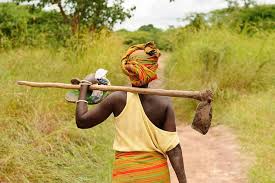
Her Farm, Her Story: A Cry for Justice, A Call for Change
Life is full of unexpected turns. My name is Alexandra Ngaiza for those who are new here, when I joined MazaoHub as the Head of Business and Marketing, I thought it was just another corporate job—business as usual. I had worked in major companies across various sectors, and I assumed MazaoHub would be no different. I was wrong.
My role seemed simple—overseeing communications, promoting MazaoHub’s digital agronomy services, ensuring research findings reached farmers in an understandable way, and streamlining the agricultural supply chain. I believed my job was just about structuring business strategies until I encountered something that shattered my beliefs and broke my heart into a thousand pieces.
Her name was Mama Bao.
She walked into the MazaoHub Farmer Excellence Center with her husband, Mzee Bao, to register as MazaoHub farmers. They appeared to be a loving couple, hand in hand, full of hope. Mzee Bao was listed as the owner of their 8-acre farm, where they planned to cultivate rice. I was moved by their bond and saw them as a symbol of unity in farming.
Since I was new to the field, I spent time at the center learning firsthand about our farmers. I stayed in touch with them, often speaking more with Mama Bao because women connect easily. One day, I called the center to check on their progress, expecting to hear about their joint efforts on the farm. But what I learned crushed me.
Mzee Bao had never set foot in the rice fields after registration.
Day after day, it was Mama Bao, her 13-year-old daughter, and her 8-year-old son who tilled the land. With no modern farming equipment, they worked tirelessly, plowing by hand. The MazaoHub team visited them regularly, providing guidance and support, but it was always Mama Bao who took the lead. She never complained, never faltered. She was determined to make the farm flourish.
One day, while visiting Ifakara, I decided to check on Mama Bao. I found her knee-deep in mud, uprooting weeds by hand, sweat drenching her clothes. Two other women labored beside her. I couldn’t stand there and watch—I knelt beside her, pulling weeds as we talked. For a brief moment, I walked in her shoes.
The next day, I fell sick.
The little work I had done for barely an hour had drained me. I couldn’t imagine doing it daily, yet Mama Bao did it every single day. I saw firsthand the resilience of women in agriculture, their unshakable spirit, their sacrifices. And I cried.
Months passed, and I received wonderful news—Mama Bao’s rice fields had flourished. The harvest was ready. I was eager to celebrate her success, but the day of the harvest brought heartbreak.
Mzee Bao had returned.
After months of absence, he appeared on the day of harvest, as though he had been there all along. MazaoHub, believing they were supporting both husband and wife, helped him harvest and sell the rice. The funds were transferred to him, as he was registered as the farm owner. We thought we had done our job well—connecting a farmer to markets, ensuring his produce earned him a good price. We thought we had succeeded.
Two weeks later, we received a call from Mama Bao. She was in tears.
“Why did you give my husband all the money?” she wept. “I was the one who worked in that field. I was the one who poured my sweat into that farm. I was the one who fought for that harvest. Now, my daughter cannot go to school because I have no money for her fees. My husband took everything. He spent it on his other wives. I have nothing. Nothing!”
Her words shattered me. My heart ached in ways I had never felt before. I had once envied her, thinking she had a loving husband, but behind the smiles lay a cruel reality. She was nothing more than a laborer on land she did not own, a woman who toiled endlessly only to see her hard work stolen from her hands.
She was a prisoner in her own farm.
I sat with the MazaoHub team, and we made a decision: This could not continue. We had to fight for women like Mama Bao. Women who wake before dawn to tend fields they do not own. Women whose sweat is stolen. Women whose dreams are crushed by a system that does not recognize them.
That day, Her Farm, Her Story was born.
This was not just a campaign. This is a movement. An initiative. A fight for justice. A commitment to ensuring women farmers own their land, receive direct payments for their produce, and gain access to farming loans and fair market opportunities. It became a mission to see that no woman’s hard work is erased by the stroke of a signature.
We started working to ensure women farmers were connected directly to market systems so they would receive payments into their own accounts. We fought to create financial models where women could access credit to own land. We built networks to educate and empower them, ensuring that no mother, no wife, no woman was left behind.
There are thousands of women like Mama Bao in agriculture today—women who sweat and sacrifice, only to be pushed aside when success comes knocking.
We will not stand by and watch.
We invite you to join us.
Through your expertise, funding, business connections, partnerships, financial support, or even grants—you can be part of this change. You can help rewrite the future of thousands of women. You can help tell their stories, stories that deserve to be heard.
This is about more than just farming.
This is about dignity.
This is about justice.
This is about Her Farm, Her Story.